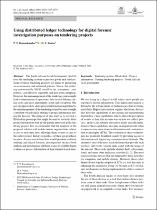 ResearchSpace
ResearchSpace
Using distributed ledger technology for digital forensic investigation purposes on tendering projects
JavaScript is disabled for your browser. Some features of this site may not work without it.
- ResearchSpace
- →
- Research Publications/Outputs
- →
- Journal Articles
- →
- View Item
| dc.contributor.author |
Ramazhamba, Pardon T

|
|
| dc.contributor.author |
Venter, HS

|
|
| dc.date.accessioned | 2023-10-17T09:08:15Z | |
| dc.date.available | 2023-10-17T09:08:15Z | |
| dc.date.issued | 2023-03 | |
| dc.identifier.citation | Ramazhamba, P.T. & Venter, H. 2023. Using distributed ledger technology for digital forensic investigation purposes on tendering projects. <i>International Journal of Information Technology, 15(5).</i> http://hdl.handle.net/10204/13159 | en_ZA |
| dc.identifier.issn | 2511-2104 | |
| dc.identifier.issn | 2511-2112 | |
| dc.identifier.uri | https://doi.org/10.1007/s41870-023-01215-9 | |
| dc.identifier.uri | http://hdl.handle.net/10204/13159 | |
| dc.description.abstract | The South African Local Government (SALG) uses the tendering system to procure goods and services. Some of these tendering projects are aimed at promoting socio-economic and industrial policies. Hence, the tendering system used by SALG should be fair, transparent, competitive, cost-effective, equitable, and free from corruption. However, the mismanagement of the tendering system might lead to interruption of operations, late service delivery, rising costs, and most importantly, fraud and corruption. The use of paperwork to share project information might lead to the mismanagement of the tendering project because it might contribute towards illicit altering of project information during the process. The purpose of this study is to develop a Blockchain prototype that might be used to securely share project information with all the parties interested in the tendering project. It is recommended that the adoption of the proposed solution will enable various organisations to have access to real-time data, allowing them to have access to the entire project history regardless of their geographical location. Access to real-time data would promote real-time auditing and digital forensic investigations because both auditors and investigators will have access to credible digital evidence or project information of their interest in real-time. | en_US |
| dc.format | Fulltext | en_US |
| dc.language.iso | en | en_US |
| dc.relation.uri | https://link.springer.com/article/10.1007/s41870-023-01215-9 | en_US |
| dc.source | International Journal of Information Technology, 15(5) | en_US |
| dc.subject | Tendering system | en_US |
| dc.subject | Blockchain | en_US |
| dc.subject | Project information | en_US |
| dc.subject | Sharing tendering projects | en_US |
| dc.subject | South African local government | en_US |
| dc.title | Using distributed ledger technology for digital forensic investigation purposes on tendering projects | en_US |
| dc.type | Article | en_US |
| dc.description.pages | 1255–1274 | en_US |
| dc.description.note | This article is licensed under a Creative Commons Attribution 4.0 International License, which permits use, sharing, adaptation, distribution and reproduction in any medium or format, as long as you give appropriate credit to the original author(s) and the source, provide a link to the Creative Commons licence, and indicate if changes were made. | en_US |
| dc.description.cluster | Next Generation Enterprises & Institutions | en_US |
| dc.description.impactarea | Distr Ledger Technologies | en_US |
| dc.identifier.apacitation | Ramazhamba, P. T., & Venter, H. (2023). Using distributed ledger technology for digital forensic investigation purposes on tendering projects. <i>International Journal of Information Technology, 15(5)</i>, http://hdl.handle.net/10204/13159 | en_ZA |
| dc.identifier.chicagocitation | Ramazhamba, Pardon T, and HS Venter "Using distributed ledger technology for digital forensic investigation purposes on tendering projects." <i>International Journal of Information Technology, 15(5)</i> (2023) http://hdl.handle.net/10204/13159 | en_ZA |
| dc.identifier.vancouvercitation | Ramazhamba PT, Venter H. Using distributed ledger technology for digital forensic investigation purposes on tendering projects. International Journal of Information Technology, 15(5). 2023; http://hdl.handle.net/10204/13159. | en_ZA |
| dc.identifier.ris | TY - Article AU - Ramazhamba, Pardon T AU - Venter, HS AB - The South African Local Government (SALG) uses the tendering system to procure goods and services. Some of these tendering projects are aimed at promoting socio-economic and industrial policies. Hence, the tendering system used by SALG should be fair, transparent, competitive, cost-effective, equitable, and free from corruption. However, the mismanagement of the tendering system might lead to interruption of operations, late service delivery, rising costs, and most importantly, fraud and corruption. The use of paperwork to share project information might lead to the mismanagement of the tendering project because it might contribute towards illicit altering of project information during the process. The purpose of this study is to develop a Blockchain prototype that might be used to securely share project information with all the parties interested in the tendering project. It is recommended that the adoption of the proposed solution will enable various organisations to have access to real-time data, allowing them to have access to the entire project history regardless of their geographical location. Access to real-time data would promote real-time auditing and digital forensic investigations because both auditors and investigators will have access to credible digital evidence or project information of their interest in real-time. DA - 2023-03 DB - ResearchSpace DP - CSIR J1 - International Journal of Information Technology, 15(5) KW - Tendering system KW - Blockchain KW - Project information KW - Sharing tendering projects KW - South African local government LK - https://researchspace.csir.co.za PY - 2023 SM - 2511-2104 SM - 2511-2112 T1 - Using distributed ledger technology for digital forensic investigation purposes on tendering projects TI - Using distributed ledger technology for digital forensic investigation purposes on tendering projects UR - http://hdl.handle.net/10204/13159 ER - | en_ZA |
| dc.identifier.worklist | 26966 | en_US |





